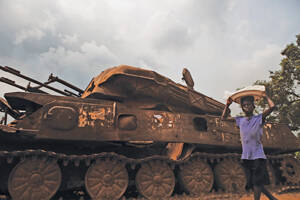The conviction of Liberia’s former president, Charles Taylor, should send a clear message that the era of impunity for heads of state guilty of war crimes and crimes against humanity is over, said Professor Rosa Brooks of Georgetown University Law Center. On April 26 Taylor became the first African head of state convicted by an international tribunal for such offenses.
The verdict should be especially of interest, said Brooks, to current leaders such as Omar al-Bashir of Sudan, who is already under indictment, and others, like Bashar al-Assad of Syria, who may be facing prosecution in the future. “Bashir should be paying close attention to this, and he should be worried,” said Brooks.
“It’s good to see [Taylor] brought to justice,” Brooks added. “He played an enormous role in perpetuating the conflict in Sierra Leone and Liberia. It was a particularly brutal conflict with atrocities, mutilation, use of coerced child soldiers, rape, you name it.” She added, “It’s quite clear that the conflict would not haven been as brutal or sustained had it not been for Taylor’s willingness to supply weapons” to rebel forces in Sierra Leone. Taylor accepted what came to be known as “blood diamonds” in exchange for his support of Sierra Leone’s Revolutionary United Front.
Taylor, 64, was convicted on all charges—five counts of crimes against humanity and six counts of war crimes—for aiding and abetting such offenses as murder, rape, conscripting child soldiers and sexual slavery during intertwined wars in Liberia and Sierra Leone. Taylor, who was president of Liberia from 1997 to 2003, supported and directed R.U.F. rebels in the 11-year civil war in neighboring Sierra Leone that killed more than 50,000 people. His sentence will be handed down on May 30.
Joe Turay, the head of Caritas Makeni, in Sierra Leone, said Taylor’s conviction “is only part of the process.”
“We mustn’t forget the plight of the survivors of this horrific war who are still suffering: the orphans, the amputees, the displaced and the thousands who are still living with the mental trauma of the horror of the war,” he said. “They are all in need of investment to support them to rebuild their shattered lives.”
Brooks said Taylor’s conviction was significant in a number of ways. The tribunal’s decision, she said, “sends the message [that] the age in which you could say, ‘I have immunity because I was acting as a head of state’ is over.” State leaders will no longer be allowed to flee into exile or relinquish office without being held responsible for their crimes. According to Brooks, the deterrent value of that precedent is worth the short-term dilemma it may create. Because of the Taylor decision, the international community will have one less carrot to offer when dealing with contemporary perpetrators of crimes against humanity. In the long run, however, said Brooks, “You want to have a system where current and future heads of state will think twice before they commit crimes against humanity.”
The verdict was also important, said Brooks, because it demonstrated the effectiveness of the “hybrid court” in the Hague. Taylor was convicted by the U.N.-sponsored Special Tribunal for Sierra Leone, jointly composed of jurists from the international community as well as from Sierra Leone itself. The use of such a mixed tribunal, said Brooks, allows the victims of war crimes to take an active role in bringing perpetrators to justice and has a secondary effect of improving judicial capacity in the victimized state.








